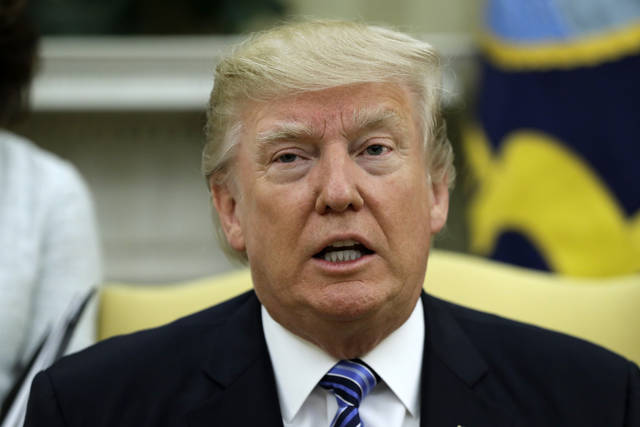WASHINGTON — Republican divisions over health care multiplied Monday as President Donald Trump pressured GOP senators to act quickly, and Vice President Mike Pence suggested they might have to revert to a straightforward “Obamacare” repeal if they can’t agree on
WASHINGTON — Republican divisions over health care multiplied Monday as President Donald Trump pressured GOP senators to act quickly, and Vice President Mike Pence suggested they might have to revert to a straightforward “Obamacare” repeal if they can’t agree on an alternative.
Consensus on a replacement seemed more remote than ever as senators returned to the Capitol from a Fourth of July recess. Some lawmakers spent the break facing critics of Senate Majority Leader Mitch McConnell’s bill, or voicing criticism of their own. But Sen. John Cornyn of Texas, the No. 2 Republican, told reporters that a revised bill would be unveiled this week, and “the goal continues to be to” vote next week.
McConnell abruptly postponed a vote last month, lacking GOP support for legislation he wrote largely in secret.
To succeed, the new legislation will have to address the concerns of conservatives like Mike Lee of Utah and Ted Cruz of Texas, who want a more full-blown repeal, and moderates like Susan Collins of Maine and Lisa Murkowski of Alaska, who want essentially the opposite, a more generous bill.
McConnell has little room for error as he tries to pass a bill with 50 GOP votes, and Pence as the tie-breaker, in a Senate split 52-48 between Republicans and Democrats. Some GOP senators are questioning McConnell’s partisan approach, and the majority leader himself acknowledged to a home-state audience in Kentucky last week that if he can’t get the job done with Republicans alone, he’ll have to turn to Democrats to shore up the market for individual insurance buyers.
Collins, referring to President Barack Obama’s Affordable Care Act, passed in 2010 without a single Republican vote, told reporters: “I believe that we should not repeat the mistake that President Obama made in passing major legislation with no support from the other party.”
The Republican Party has been campaigning against Obama’s law ever since, but having ridden the issue to control of the House, Senate and the White House, they’re finding it nearly impossible to coalesce around an alternative.
Underscoring the divisions within the GOP, and an occasional communications vacuum between the White House and the Senate, Pence appeared on conservative host Rush Limbaugh’s radio show to rule out working with Democrats.
“The president’s made it very clear. We believe if they can’t pass this carefully crafted repeal and replace bill, do those two things simultaneously, we ought to just repeal only,” and then turn to replacement legislation later on, Pence said, although Trump has at times dangled the prospect of working with Democrats.
Few Republicans on Capitol Hill believe a repeal bill could pass Congress without a replacement.
Congress is beginning a three-week sprint toward its traditional five-week August recess, which some lawmakers have suggested should be shortened or even canceled if they can’t get health care done first, though that’s unlikely to happen.
The House managed to pass health care legislation in May after plentiful struggles of its own to reach agreement. Both the House and Senate bills eliminate Obamacare’s mandates for people to buy insurance and individuals to provide it, gradually undo an expansion of Medicaid and reduce the size of the federal-state health care program for the poor and disabled. The measures would cut taxes for the wealthy.
Both bills would result in more than 20 million people kicked off insurance rolls over the next decade, numbers that have spooked lawmakers eyeing re-election.
Around 80 demonstrators opposed to the legislation were arrested around the Capitol complex Monday, according to U.S. Capitol Police.
Also Monday a study found that the number of uninsured adults has grown by 2 million this year, underscoring that recent coverage gains have begun to erode.
The Gallup-Sharecare Well-Being Index found that the uninsured rate among adults was 11.7 percent in the second three months of this year, compared with a record low of 10.9 percent at the end of last year. The reduction could reflect rising premiums and dwindling choices in the insurance markets created under Obama and could also flow from Trump administration actions and comments about withholding support for the law.



